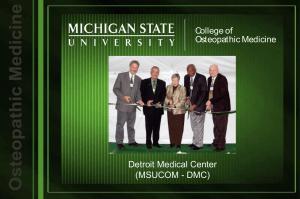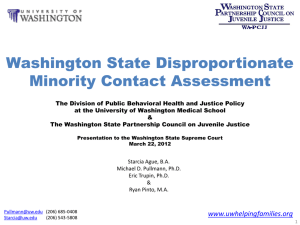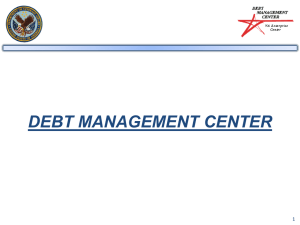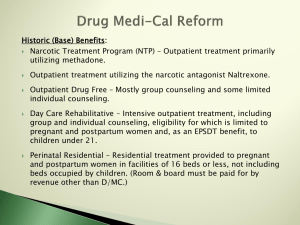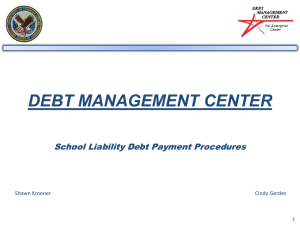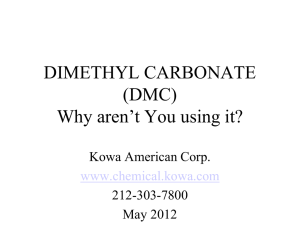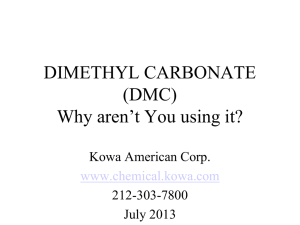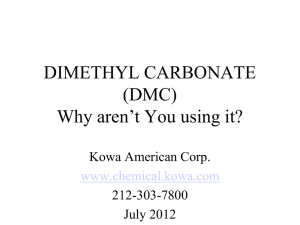DIMETHYL CARBONATE - Kowa American Corporation
advertisement
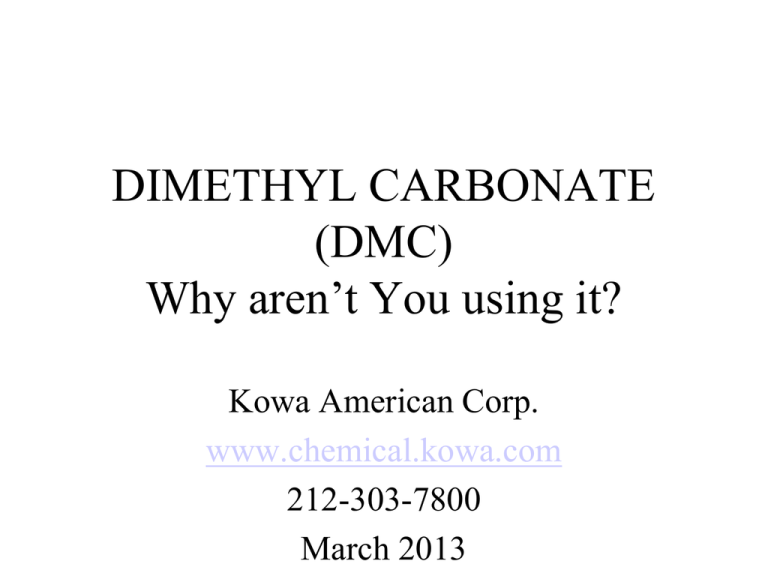
DIMETHYL CARBONATE (DMC) Why aren’t You using it? Kowa American Corp. www.chemical.kowa.com 212-303-7800 March 2013 DMC Structure • Dimethyl Carbonate CAS # 616-38-6 DMC Introduction • DMC is an inexpensive oxygenated solvent with excellent solubility properties, that can solve almost all coating resins. • DMC is now cheaper than MEK, Ethyl Acetate, MIBK, Butyl Acetate and most other Ketones and Glycol Ethers. • DMC is price competitive with acetone, toluene, ethanol and mineral spirits DMC Supply • Drums and bulk isotanks readily available from multiple factories in China. • DMC is used in very large volumes in China for coatings primarily because of its low cost. • Totes can be filled from isotanks. • Long term a bulk tank in USA is possible DMC Expected Uses • DMC has shown promise in Auto refinish and concrete coatings with its favorable solubility, odor, evaporation rate and economic profiles • Industrial coatings for coating parts and architectural components at factories have shown similar appeal. • Also used in traffic paints, steel drum linings, floor coatings and architectural coatings MEK and TBAC replacement • DMC is cheaper than both these solvents, with very similar properties. • Anyone using these two solvents should be immediately considering using DMC! • Only users of TBAC for Canadian market cannot use DMC as VOC exempt there yet. PCBTF Replacement • PCBTF has increased to almost $ 2.50/lb recently, PCBTF has an objectionable odor Advantages for Regional Coatings Manufacturers • Large National coatings manufacturers presently do not want to have multiple formulations in different states and Canada. • Local and regional coatings companies have more flexibility to avoid the non-exempt California districts and Canada thereby having very cost competitive and superior products available for sale. DMC General Properties • DMC is a colorless, fast evaporating solvent • Has substantial polar nature, and moderate hbonding strength effective in replacing esters, glycol ethers and ketones in formulations • Has low toxicity, an unobjectionable methanol type odor and low skin irritation • Freezes at 2 – 4 ºC (36 –38 ºF) • Flammable Liquid, Flash point 17 ºC (63 ºF) DMC Evaporation Rate DMC’s moderate to fast evaporation rate (3.22) BuAC = 1.0, is similar to tBAC (2.8), isopropyl acetate (3.0) and the major gasoline components Heptane (3.18) and trimethyl pentane (3.63) Can be used to as slightly slower evaporating replacement for MEK (3.8), Ethyl Acetate (4.1) Or a faster evaporating replacement for Toluene (2.0), Isopropanol (1.7), MPK (2.3), Ethanol (1.8), Methanol (2.1) and MIBK (1.6) DMC’s Odor Profile • One of DMC’s most favorable properties is a mild and non-offensive odor. • PCBTF and Tert-Butyl Acetate odors are much more pronounced and pungent • Noxious solvent odors are perhaps the most important concern of neighbors to body shops, factories, print shops and other industrial settings • Mild odor is well received by workers handling DMC or used in their work areas DMC Solubility Properties • Hildebrand solubility parameter 20.3 Mpa • Hansen solubility parameters: Dispersion 15.5 polar 3.9 h-bond 9.7 molar vol. 84.2 • Almost identical solubility parameters to some common glycol ethers: cellosolve acetate, ethylene glycol butyl ether acetate, propylene glycol monobutyl ether. • Ethyl acetate, 2-ethylhexanol, methylene chloride and MIBK have similar solubility parameters DMC Solubility Properties DMC has been described as useful in acrylics, urethanes, epoxies and alkyd systems. DMC is miscible with almost all organic solvents DMC would easily replace oxygenated solvents like esters, ketones & glycol ethers DMC can replace alcohols, aromatics and aliphatics with appropriate co-solvents and/or reformulation work DMC - Flammability • DMC has a flashpoint of 63ºF (17ºC) • Flammability will limit use in consumer coatings, cleaning or indoor applications • Flammability risk still much lower than acetone (-4º F), ethyl acetate (26ºF) or MEK (26ºF), which DMC can readily replace • Partially water soluble (up to 13 % in water), which allows water to be more effective in fighting DMC based fires. DMC in Waterborne Systems • DMC being an ester, can hydrolyze in acidic and basic aqueous conditions to methanol and carbon dioxide. • DMC may be stable in neutral conditions with suitable buffers. • DMC’s primary usage area should be in solvent borne systems, where residual water does not normally cause hydrolysis issues DMC is VOC Exempt • Dimethyl Carbonate (DMC) & Propylene Carbonate were exempted as VOC’s by EPA on Jan 13, 2009 based on Kowa’s petition to EPA in July 2004. • Each state besides California must also exempt DMC for stationary source VOC rules. • All states (besides CA) have either exempted DMC or allow for enforcement discretion (Kansas & Michigan) or allow individual stationary source permits for DMC’s use (Arkansas). DMC for Architectural & Automotive Refinish Coatings, DMC is VOC exempt in all states today except for parts of California (see slides 22 & 23) for: Architectural Coatings (subpart D), Automotive Refinish Coatings (Subpart B) DMC is exempt as a VOC in all states except for California for consumer items (subpart C) Based on Federal VOC rules (40 CFR part 59) DMC VOC Exempt States Washington March 2011 Montana Oregon May 2010 Vermont Maine Minnesota Idaho March 2010 New Hampshire Wyoming Oct. 2010 Nevada North Dakota California Each AMD must exempt New Mexico Kansas Sept. 2010 Oklahoma July 2010 Indiana Texas April 1, 2010 New Jersey Ohio West Virginia Delaware Maryland Arkansas May 2013? North Carolina South Carolina Nov. 2010 Georgia Louisiana Florida Hawaii Virginia Kentucky Tennessee August 2010 Alabama March 2010 Alaska Dec. 2010 Massachusetts Fe. 2013 Rhode Island Connecticut Pennsylvania Iowa Missouri Dec. 2010 New York Dec 2010 Michigan Illinois Colorado Arizona August 2012 South Dakota June 2010 Nebraska June 2010 Utah March 2010 Wisconsin Aug. 2010 Green states allow use of DMC as VOC exempt with no restrictions. Arkansas users must file for Stationary source permit until fully exempted in May DMC in Aerosol Coatings • DMC is allowed for use in aerosol coating in all of California using its MIR of .06 for the weighted reactivity calculations. • Effective June 7th, 2012 DMC is now allowed in Aerosol Coatings for the rest of the USA again using its reactivity factor of .06. • This ultra low reactivity factor means almost zero contribution to the final weighted average by using DMC in an aerosol coating. DMC Exemption Status in Calif. • San Joaquin Valley, San Diego, Sacramento, Monterey Bay, Mohave, Butte ,Ventura, Colusa & Feather River AMD’s have exempted DMC as a VOC with no restrictions on use. • There are no VOC rules in most northern and mountain AMD’s (DMC functionally exempt) • Shasta, Glenn, El Dorado, Tehema & San Luis Obispo AMD’s may require a variance for some stationary sources. • Santa Barbara users must file for a permit DMC SCAQMD • South Coast AQMD (Los Angeles area) has issued a proposed metal coatings rule 1107 allowing for no permit for volumes under 180,000 lbs per year, permits required for above this threshold. There will be reporting requirements for all users in SCAQMD. • After this rule has been approved, we will request DMC to be exempted for all uses here, since proposed rule treats DMC as safer to use than TBAC (560 lb permit threshold) Bay Area, Shasta, Yolo-Solano, Tehema, Imperial AMD’s • BAAQMD plans to publish a proposed rule exempting DMC as a VOC this spring. Initial indications are that permits will not be required. • Shasta, Tehema & Yolo-Solano indicate proposed rules also to be published soon. • Imperial is waiting for a federal lawsuit with EPA to be settled, in their agenda for quick promulgation after the settlement Del Norte Siskiyou Modoc Shasta Trinity Green = DMC VOC Exempt or Functionally Exempt/ no VOC rules (no restrictions on use of DMC for architectural coatings) Lassen Tehama Yellow = DMC cannot be used as VOC exempt for Architectural coatings Plumas Butte Glenn Sierra Nevada Colusa Lake El Dorado Yolo Alpine Napa Amador Sonoma Solano Marin San Contra Joaquin Tuolumne Costa San Francisco Light Blue = In rulemaking or preparing rule, DMC cannot be used for Architectural Coatings yet Mono Alameda San Mateo Santa Santa Clara Merced Cruz San Benito Fresno Inyo Tulare Monterey Kings San Luis Obispo Kern San Bernardino Santa Barbara Los Ventura Angeles Dimethyl Carbonate (DMC) VOC Exempt Status for Architectural Coatings only Orange Riverside San Diego Imperial Del Norte Siskiyou Modoc Shasta Trinity Green = DMC VOC Exempt or Functionally Exempt/ no VOC rules (no restrictions on use of DMC) Lassen Light Green = permit or application for individual variance may be required depending on DMC’s use Tehama Plumas Butte Glenn Sierra Nevada Colusa Lake El Dorado Yolo Alpine Napa Amador Sonoma Solano Marin San Contra Joaquin Tuolumne Costa San Francisco Light Blue = DMC in rulemaking (not VOC exempt yet) Yellow = DMC not VOC exempt Mono Alameda San Mateo Santa Santa Clara Merced Cruz San Benito Fresno Inyo Tulare Monterey Kings San Luis Obispo Kern San Bernardino Santa Barbara DMC VOC Exempt status for Car Refinish and Stationary sources Los Ventura Angeles Orange Riverside San Diego Imperial California CARB Consumer items • CARB regulates “consumer product” applications (coatings are covered by each AQMD separately) • Paint thinners are in CARB’s “multi-purpose solvent” classification for all thinners not used exclusively for a specific coating and sold together with that coating. • CARB presently has no plans to exempt DMC as a VOC in consumer products although their proposed Paint thinner rules will now effectively allow only acetone and PCBTF in paint thinners. Paint Thinner in OTC States • DMC being exempt soon in all of the OTC states will be a perfect solvent for use in 2014 when the OTC paint thinner and multipurpose solvent rules come into effect. • These strict limits patterned after California’s CARB solvent rules are very burdensome for California businesses and residents, DMC will allow considerable leeway in meeting these VOC limits in the OTC & other states. DMC – Toxicity • DMC (like all methyl esters) rapidly deesterifies in the body to methanol & CO2 • DMC has low acute oral toxicity (LD50 rat 12,900 mg/Kg, LD50 mouse 6,000 mg/Kg) • DMC was found to be negative in mutagenic tests (in vitro Ames & comet assay) • Readily biodegradable and has low potential to bio-accumulate or be persistent in environment • Not expected to be toxic to fish or bacteria (possibly toxic to algae) DMC & Methanol toxicities • Kowa recommends an 8 hour industrial PEL of 100 ppm based on DMC’s toxicity profile and that of its metabolite Methanol. This is similar to the TLV exposure restrictions of Toluene. • DMC has small amounts of methanol impurities (normally under 100 ppm), which has recently been declared a Proposition 65 chemical • Well run study by Exxon/Mobil on DMC’s teratogenic potential confirms it is virtually identical to Methanol’s (NOEL 1,000 ppm) Calif. OEHHA Conclusion • OEHHA report concluded that doses levels of DMC likely to be achieved by environmental exposures to the public by inhalation appears to have “relatively minor” environmental health concerns including no evidence of carcinogenicity • Established interim acute and chronic REL, where the acute REL is identical to MEK’s and the chronic REL similar to Isopropanol’s DMC Responsible Care • Kowa American is committed to Responsible Care® guidelines, we are upset with competitor’s and enduser’s MSDS not referencing DMC’s potential health hazards! • We are urging all suppliers and users of DMC to: Reference an industrial workplace REL of 100 ppm max. air over an 8 hour workday Reference Methanol as DMC’s metabolite Treat poisoning the same as methanol poisoning BENZOTRIFLUORIDE - BTF • Proposed VOC exempt solvent, EPA tabled petition due to BTF’s revised MIR values (2.8) in 2009 being higher than ethane (2.7). • BTF is now allowed for aerosol coatings on federal level (June 2012), and is still allowed in Aerosol coatings in Calif. with a MIR value or reactivity factor of .26 (2004 table). • BTF’s similar solvency and evaporation rate (BTF = 2.8 vs toluene = 2.0) to toluene makes BTF a great replacement for toluene. Flashpoint, E. rate, Boiling point Evaporation Flashpoint Rate ºF BuAc =1.0 Boiling point ºC DMC 3.22 63 90 PCBTF .9 109* 139 Acetone 5.6 -4 56.5 <.005 269.6 240 Prop Carb tBAc 2.8 40 98 BTF 2.8 54 102 MIR Reactivity Values (2009) MIR gram basis MIR mole basis DMC 0.055 4.95 Ethane 0.26 7.8 Acetone 0.35 20.3 Methyl Acetate 0.067 5.2 Prop Carbonate 0.27 27.56 Benzotrifluoride 0.28 40.91
